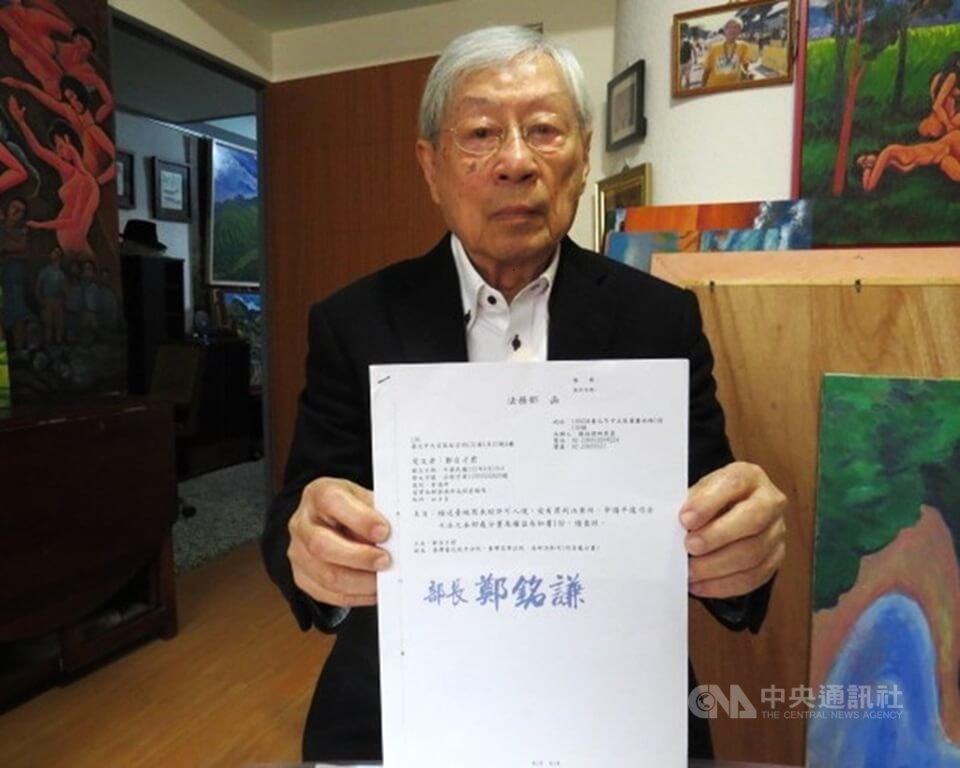In April 1970, Cheng Tzu-tsai (鄭自才) and his brother-in-law Huang Wen-hsiung (黃文雄) attempted to assassinate then-vice premier Chiang Ching-kuo (蔣經國) while he was visiting New York.
They were both apprehended after the attempt failed, and subsequently fled from the US after being released on bail. Cheng was later caught in Sweden and extradited back to the US, where he served a prison term.
However, the failed assassination attempt sparked a wave of Taiwanese independence movements overseas and forced Chiang to confront authoritarian governance issues when he later became president, lifting martial law in 1987.

Photo: CNA
Cheng returned to Taiwan in 1991 and was subsequently sentenced to one year in prison for illegally entering the country under the National Security Act (國家安全法).
Cheng’s case is one of thousands involving political crimes during Taiwan’s martial law period that have been redressed, according to the Ministry of Justice in an article published in a local media outlet today.
“Returning to one’s homeland is one’s right and freedom that no one should be deprived of. Coming back should not be a crime. I never thought I would be prosecuted,” Cheng said in an interview in a related article also published by the same outlet today.
Cheng, who had already served a prison sentence in the US, later applied to the ministry for redress.
As of December last year, 5,275 cases have been redressed including 2,114 administrative injustices and 3,161 judicial injustices, according to the Ministry of Justice.
Notable cases include Taiwanese democracy pioneer Peng Ming-min (彭明敏) and Cheng, exonerated in December and September last year respectively.
After the Transitional Justice Commission was dissolved in May 2022, the ministry assumed responsibility for redressing judicial and administrative injustices from the martial law period.
According to the Act on Promoting Transitional Justice (促進轉型正義條例), cases involving political victims are reviewed by a committee and confirmed by the ministry after deliberation.
Convictions or penalties deemed unlawful are considered nullified and the political victim’s relevant criminal record is cleared.
Cheng was classified as an overseas dissident at that time, restricting his entry and exit from the country, the ministry said.
Restricting his right to return to Taiwan was aimed at consolidating authoritarian rule and violated the principles of a free and democratic constitutional order, the ministry said.
The judgement concluded that he had unlawfully entered the country without providing evidence of his entry method, violating the Code of Criminal Procedure (刑事訴訟法) and subjecting Cheng to judicial injustice, it said.
The responsible agencies have been ordered to clear Cheng’s criminal record, it added.
Regarding transitional justice, Cheng said he hoped that every victim could be compensated and that every perpetrator should receive a penalty.
Cheng, who spent much of his time in prison painting, now runs an art studio focusing on Taiwan’s landscapes.
“I was born during Taiwan's martial law period when we couldn't go anywhere. I visited many places after returning to Taiwan and found it to be truly beautiful,” Cheng said.
While his conviction was the result of authoritarian rule, the redress of that injustice was made possible by democracy, he said.

An essay competition jointly organized by a local writing society and a publisher affiliated with the Chinese Communist Party (CCP) might have contravened the Act Governing Relations Between the People of the Taiwan Area and the Mainland Area (臺灣地區與大陸地區人民關係條例), the Mainland Affairs Council (MAC) said on Thursday. “In this case, the partner organization is clearly an agency under the CCP’s Fujian Provincial Committee,” MAC Deputy Minister and spokesperson Liang Wen-chieh (梁文傑) said at a news briefing in Taipei. “It also involves bringing Taiwanese students to China with all-expenses-paid arrangements to attend award ceremonies and camps,” Liang said. Those two “characteristics” are typically sufficient

A magnitude 5.9 earthquake that struck about 33km off the coast of Hualien City was the "main shock" in a series of quakes in the area, with aftershocks expected over the next three days, the Central Weather Administration (CWA) said yesterday. Prior to the magnitude 5.9 quake shaking most of Taiwan at 6:53pm yesterday, six other earthquakes stronger than a magnitude of 4, starting with a magnitude 5.5 quake at 6:09pm, occurred in the area. CWA Seismological Center Director Wu Chien-fu (吳健富) confirmed that the quakes were all part of the same series and that the magnitude 5.5 temblor was

The brilliant blue waters, thick foliage and bucolic atmosphere on this seemingly idyllic archipelago deep in the Pacific Ocean belie the key role it now plays in a titanic geopolitical struggle. Palau is again on the front line as China, and the US and its allies prepare their forces in an intensifying contest for control over the Asia-Pacific region. The democratic nation of just 17,000 people hosts US-controlled airstrips and soon-to-be-completed radar installations that the US military describes as “critical” to monitoring vast swathes of water and airspace. It is also a key piece of the second island chain, a string of

The Central Weather Administration has issued a heat alert for southeastern Taiwan, warning of temperatures as high as 36°C today, while alerting some coastal areas of strong winds later in the day. Kaohsiung’s Neimen District (內門) and Pingtung County’s Neipu Township (內埔) are under an orange heat alert, which warns of temperatures as high as 36°C for three consecutive days, the CWA said, citing southwest winds. The heat would also extend to Tainan’s Nansi (楠西) and Yujing (玉井) districts, as well as Pingtung’s Gaoshu (高樹), Yanpu (鹽埔) and Majia (瑪家) townships, it said, forecasting highs of up to 36°C in those areas